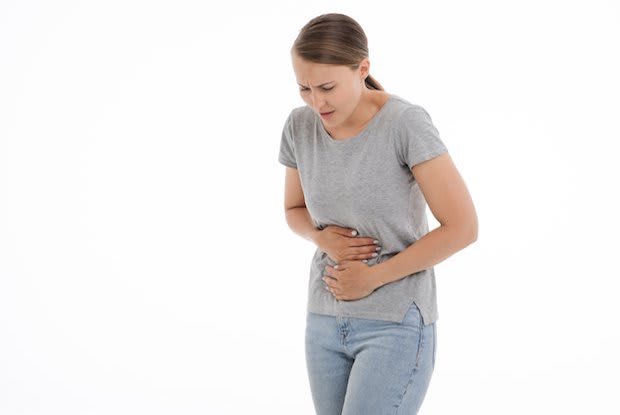Table of Contents
I. What is Ulcerative Colitis?
a. What Causes Ulcerative Colitis?
II. Diet Tips for Ulcerative Colitis Patients
d. Cook and Peel Your Fruit and Veg
e. More Meals but Smaller Meals
f. Increase Your Calories If Needed
What is Ulcerative Colitis?
Ulcerative colitis (UC) is an inflammatory bowel disease (IBD) that affects around 750,000 people in North America. [1] UC is a chronic condition that affects the lining of your colon and rectum, causing bloody diarrhea, severe pain, cramping, and an urgent need to defecate.
While UC is a chronic disease, it tends to occur in cycles. There are several effective medications that can help reduce symptoms. UC is often treated with an anti-inflammatory, such as mesalamine (Lialda or Asacol) as well as an immunosuppressant medication like azathioprine (Imuran). Approximately half of UC patients are currently in remission and only around 1 percent of UC patients suffer severe symptoms. [2]
While the exact cause of ulcerative colitis is unknown, it is believed to be an autoimmune disease. For most people, the body’s immune system works to keep the body healthy. When there is a harmful, foreign substance in the body, such as a virus or form of bacteria, the immune system attacks and destroys this substance, preventing you from becoming ill. However, for people that have autoimmune diseases such as UC, the immune system can wrongly identify food and helpful bacteria. This results in white blood cells wrongly attacking the lining of the colon and intestines, which causes ulcers and inflammation. As it is often food that the immune system mistakenly attacks, diet can play a key part in flare-ups of ulcerative colitis. Keep reading to learn about foods that you should enjoy and foods that you should avoid if you have UC. There are many foods that often trigger or aggravate the symptoms of ulcerative colitis. However, even common trigger foods may not affect everybody with the condition. UC patients should consider keeping a food journal. This should track what you eat and drink and the severity of symptoms. Over time, this should hopefully help you narrow down or pinpoint any foods that trigger symptoms. It can also help you identify foods and drinks that do not cause UC symptoms. [3] Protein is always important as part of a nutritious diet because your body uses protein to build and repair body tissue. There are several foods that are rich in protein that most UC patients should be able to tolerate. This includes fish, poultry, eggs, lean pork, soy, and firm tofu. [4] During a flare-up or when recovering from inflammation, UC patients may need to eat an increased amount of protein. If eating meat for protein, it is always best to eat low-fat or lean cuts as excess fat may worsen your symptoms [3] The primary symptom of ulcerative colitis is diarrhea. Repeated diarrhea can cause dehydration, so it is vital that UC patients get plenty of fluids. Water is the best source of fluid, although tomato juice and broth are also beneficial. When drinking water, it should not be ice-cold, as this can cause or worsen cramps in some patients. However, not all fluids are beneficial and there are some fluids that should be avoided or limited. Alcohol actually increases your risk of dehydration. Both alcohol and caffeine can worsen the effects of diarrhea, while fizzy or carbonated drinks may cause flatulence. [3] [5] Fruit and vegetables are an important part of a healthy diet for everyone. Unfortunately, some IBD patients can find it difficult to tolerate fruit and vegetables. Peeling or removing the skin and cooking your fruits and vegetables can be easier for UC patients to eat and digest. While you may lose some of the nutrients by cooking these foods, they should be much easier to tolerate. Easier options include bananas, cantaloupe, potatoes, squash, and cucumbers. [6] Patients that have ulcerative colitis do not need to eat less than others. However, it can be beneficial to eat more, smaller meals, rather than the traditional breakfast, lunch, and dinner. Eating five or six smaller meals each day can help control your symptoms. If these are half the size of your previous portions, you will be getting the same amount of food and nutrients as you would otherwise. However, you will be less likely to overwhelm your digestive tract. [5] [6] A common symptom of ulcerative colitis can be unexplained weight loss. If this happens to you, then speak to your doctor or a nutritionist. It can be beneficial to increase your daily calorie intake by between 250 and 500 calories a day. This does not mean that you need to binge out on unhealthy and problematic fatty foods. Instead, you can add an extra small meal or snack each day, or add extra oil, or dairy into your existing meals. [3] The content provided in this article is based on thorough research and in some cases, reviewed by a medical professional. Our goal for the information is to provide helpful, general health informational. It is not intended as a substitute for professional medical advice.
a. What Causes Ulcerative Colitis?
Diet Tips for Ulcerative Colitis Patients
a. Keeping a Diary

b. Eat the Right Protein
c. Get Plenty of Fluids

d. Cook and Peel Your Fruit and Veg
e. More Meals but Smaller Meals
f. Increase Your Calories If Needed
